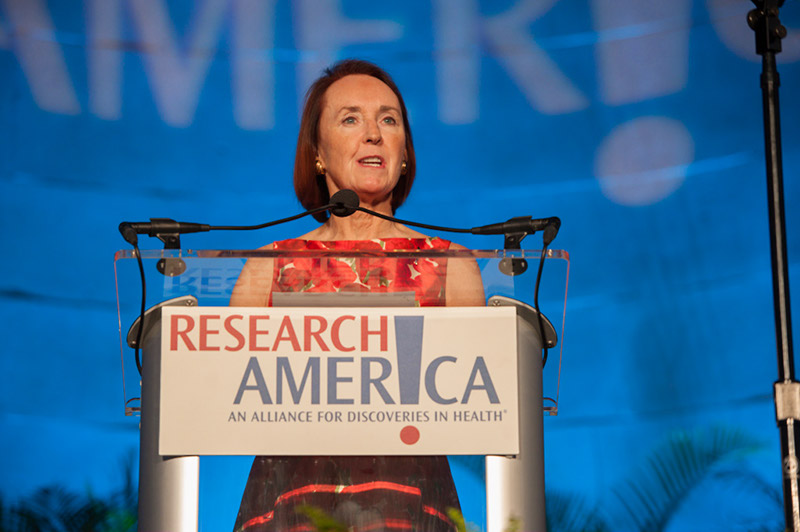Covid Deaths Be Not Proud

Dear Research Advocate,
As we mourn the million-death milestone in the U.S. for the COVID-19 pandemic, it’s challenging to conceptualize the toll. Both Axios and Politico have published excellent graphics to help put the horrifying number in context. But we’re not done yet. Nor can we ignore the soaring increase in overdose deaths just reported by CDC. And more concerns are in the mix as well (see emphasis on mental health below).
You might well ask, as we do: why hasn’t our nation assigned a much higher priority to research and innovation to drive down death rates and help us overcome our current crises, as well as to prepare us to overcome future, inevitable, health threats?
On the Hill: In order to ready the nation to face down the next COVID surge with vaccines, testing, and treatments, Congress needs a nudge from advocates. Please reach out to your House and Senate members to urge them to pass supplemental funding. And sign up for a discussion with the Cook Report’s Amy Walter, who has been querying voters about attitudes on pandemic preparedness (read on for details).
Urgent Action on FY23 NIH Funding: Congress also needs a nudge on appropriations. Please add your organization’s name to the letter we are circulating to House and Senate leaders urging a FY23 Labor-HHS-Education Subcommittee funding allocation for NIH commensurate to our nation’s medical and health research needs.
At a recent hearing, House Appropriations Committee Chair Rosa DeLauro (D-CT) said, “longstanding support for biomedical research” is essential to address health threats and challenges. Labor-HHS-Education Subcommittee Ranking Member Tom Cole (R-OK) said, “each dollar invested in the NIH is, in my view, a down payment on our future.” We have wonderful congressional champions, but we need more.
More than 100 organizations have joined our letter. Don’t neglect signing on — numbers speak volumes! The deadline for signatures is Friday, May 13.
Emphasis on Workforce Diversity at NIH: Nature writer Max Kozlov has interviewed researchers about lessons learned from the COVID-19 pandemic that could help shape the future of NIH. Shirley Tilghman, PhD, molecular biologist and president emeritus at Princeton University, commented regarding the rapid development of the COVID-19 vaccine that it “is an accomplishment for the ages;” indeed, achieving faster innovation is possible and should be sustained.
Kozlov’s piece mirrors many of the suggestions made in Beyond 2020: A Vision and Pathway for NIH; Tilghman and I served on the working group for the report, which was led by UCSF’s Keith Yamamoto and published by the Coalition for the Life Sciences. A crucial concern brought out in both Kozlov’s article and the Vision report is the imperative of enhancing workforce diversity, drawing on all — not just a subset — of the nascent talent of our nation. It’s time for action and the Vision report lays out several specific recommendations.
Register for an NIH-hosted online discussion, “How Does Diversity Impact Science?,” Tuesday, May 17, from 1 to 2:30 p.m. ET, that will explore evidence showing that diverse, inclusive teams enhance creativity, innovation, and productivity in science.
Focus on Mental Health: In both our recently commissioned national survey and Virginia survey, mental health registers as the third highest health concern among the public, behind COVID-19 and cost of health care. May is Mental Health Awareness Month. Ways you can engage:
- Join Research!America in “Committing to Mental Health Excellence in the Workplace.” Sign on here.
- Partner with the National Alliance on Mental Illness to amplify the message “Together for Mental Health.”
- Educate yourself (and share with others) via the American Psychiatric Association’s new series of short explainer videos.
- Join the initiative organized by the American Foundation for Suicide Prevention, the American Psychological Association, and others: #MoreForMentalHealth campaign
The scientific workforce faces its own mental health challenges. A summer 2020 survey of postdoctoral researchers conducted by Nature found a shocking 51% of respondents reported considering leaving science due to work-related mental-health concerns. In a compelling proposal just published by the Day One Project, Sophia Kaska, PhD, Research!America’s Manager of Science Initiatives and Outreach, calls for specific actions to address the mental health crisis among pre- and post-doctoral researchers in STEM.
ICYMI: Robert Valdez, PhD, director of the Agency for Healthcare Research and Quality (AHRQ), joined us this week to discuss how AHRQ is dedicated to patient and health professional safety, improving patient care, and rebuilding our healthcare system to achieve equity by transforming scientific discoveries into evidence-based clinical therapies. Watch the recording.
Upcoming Alliance Member Discussion: Join us on Tuesday, May 17, from 1 to 1:45 p.m. ET for a conversation with Amy Walter, Publisher and Editor-in-Chief of the Cook Political Report, and regular panelist on PBS NewsHour and NBC’s Meet the Press, among others, about prospects for the mid-term elections.
Amy will also cover current voter attitudes about pandemic preparedness and the implications for the broader policy and political landscape. Following Amy’s presentation, there will be a brief follow-up discussion with Hill veterans Pete Rouse and Pete Kirkham. NOTE: This conversation will not be recorded.
Stay well, stay safe, and stay connected.
Mary Woolley




